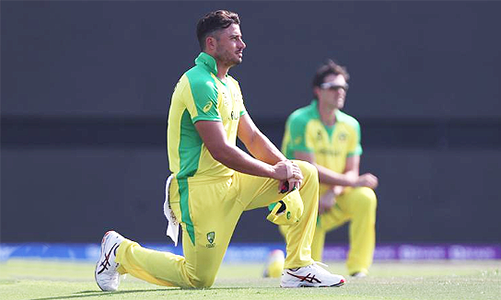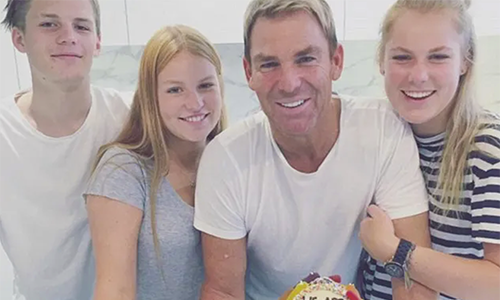
by PAUL COLLITS – “REMEMBER man that thou art dust, and unto dust thou shall return”.
Catholics and other Christians familiar with Ash Wednesday rituals (and Genesis) will be familiar with these words.
They remind us of the fragility of earthly life and of its inevitable completion. This week, they meant much, and not only to cricket tragics.
- In Shane’s case, he will, indeed, be “up there”, there in this case being the soon-to-be-re-named SK Warne Stand.
- These kinds of deaths – the manner of them – leave us without any sort of explanatory capability.
- Rest in peace.
As we in flooded Lismore, NSW, know so well, life and death are anything but predictable.
In a week of floods, literally at my doorstep, and wars, I suffered quite a shock on the day of writing.
PONDER
At a time where another shock seemed impossible, I found out that rugby league’s greatest ever player, certainly Australia’s – according to many who ponder these things – Johnny Raper, had passed away during February.
JR, styled “the man in the bowler hat”, died at 82, having suffered a long and sad decline with dementia.
Following a life of peerless skill on the field and considerable colour off it. Following the much earlier death of the immortal, Reg “Puff the Magic Dragon” Gasnier, and more recently, of the incomparable Graeme Langlands and “Big Sticks” Norm Provan, Raper had lingered on, a sad shadow of his former self.
Raper was almost the last Dragon standing from the peerless St George era of the 1950s and 1960s.
This week has been a time of both horrible and unexpected deaths. As floodwaters lapped at our home, and we heard of successful and unsuccessful roof rescues in our town, of the heroism of volunteers and of unspeakable bureaucratic horror, of awful suffering and reassuring charity, the city of Lismore struggled on, facing a grim future as well as a catastrophic present.
Perhaps the city, like the latter-day Raper, is destined to be a sad shadow of its former self. But we made it to the end of the week.
Then came Saturday morning. Australia awoke to news of utterly unexpected horror.
I have lived through a number of history-stopping deaths. I was a boy when JFK was cut down, and the world wept uncontrollably.
John Lennon. Harold Holt. Princess Diana. Michael Hutchence. Phillip Hughes. Peter Roebuck. Peter Brock.
All these deaths were markers of horror, where a well-known figure’s passing, for some special, perhaps inexplicable, reason, affects so many so very deeply.
These public deaths, each in its own awful way, had an excruciating way of cutting through to our souls.
We knew not these people personally, yet we knew them intimately. They touched our lives in ways that we only discovered, perhaps, at their passing.
In some of these cases, it is the manner of their deaths. In other instances, it isn’t the manner of their deaths, but simply the fact of their deaths, that causes us, for a brief moment, to simply stop functioning.
LINGERING
Mostly, it is when their passing occurs “before their time”. Perhaps it is before our time. We are just not ready for them to exit our lives. We still have a lingering need of them.
The past two years have seen an (dare I use the word?) unprecedented focus on death, and on preventing it, at ridiculous, previously unthinkable, cost.
We have seemed to have said, “death”, we simply cannot allow that. For whatever reason.
Perhaps it has something to do with a global loss of faith in a Higher Being and an after-life. We had all better make this life last as long as possible, and count for something. There may well be other, or additional, explanations.
The period of COVID has revealed many instances of strangeness seemingly coupled with a rise in cognitive dissonances.
We are crushed beyond sanity, it seems, by the prospect of (mostly) very old people dying of the virus, at the same time that we legislate with enthusiasm for their ability to arrange their own passing, at a time of their, and not God’s or even of their loved ones’, choosing.
We don’t blink at the fact that, over the past half century, 50m or so Western unborn babies have been, literally, crushed to death before they even had a say on the matter.
Already, seven million-plus have been terminated this year.
If you want to feel quite uneasy, you can even watch the numbers growing at worldometers.net. About one death per second.
It is curious, to say the least, that one man’s death – and by no means a horrible death, merely premature – can make virtually the entire globe – certainly its media – stand still, yet the beyond-premature and beyond-hideous deaths of 50m of God’s utterly innocent barely get a mention.
Indeed, many across the planet applaud the very fact of it.
Who among the slaughtered unborn might have emerged, say, as an international cricketer of renown? Perhaps even another legendary leg spinner?
This cognitive dissonance about the tragedy of death is incomprehensible. There is no other word for it.
SUDDEN
Speaking of cognitive dissonance, one of the ghastly things about sudden deaths in distant places is that there weren’t any opportunities for goodbyes – to immediate loved ones, let alone mates, and in some cases, fans.
Yet we have just ploughed through two years of no-goodbyes. Legislated no-goodbyes.
Mainly of the frail elderly, facing their own deaths and prevented by absurd – no, by evil – edicts from second-rate, self-preserving politicians whose diktats prescribed the most awful of deaths imaginable – separated from one’s beloved, lonely and conscious of impending death.
With all of the attendant, unspoken fears that go with that state. For many, I assume that these diktats may well have prevented dying sinners from being visited by a priest with the Last Rites.
For a sinning believer, an unprovided death bears not contemplation. All in the name of … saving lives.
Steve Waterson summed it up: “It’s barely two years since the COVID lunacy first infected us, but already its history is being rewritten. In newspaper columns and on television, opinion-laden pundits are patting the enforcers and the obedient on the back, reassuring themselves with this dazzling myth that we managed our pandemic with admirable wisdom and efficiency.
“Lacklustre politicians are understandably keen to embrace and promote this view, starting with the Prime Minister’s mantra that we ‘saved 30,000 lives’. Did we, though? Figures emerging from the few places that didn’t impose life-changing restrictions on their populations suggest they made next to no difference.
“At best we tacked an extra couple of months on to the lives of some very old people in nursing homes, then immediately cancelled whatever benefit that afforded them by turning their last weeks into a lonely, bewildering, miserable slide towards the grave when they were forbidden to see family and friends and were attended by carers dressed like astronauts. They’re mostly dead by now, but I trust they slipped away with a message of gratitude on their lips.”
“Death”, as St Thomas More said when he knew that his own life was ebbing away as the result of the use of hideous political power, “comes to us all”. It comes to great cricketers, too, at times and places not of their, or our, choosing.
CHAMPIONS
The public deaths of those we love, as if they were our own, seem unspeakable. Literally, inexplicable. We suffer shock, unimaginable grief, for the loss of our champions. When they pass before their time.
We need our champions. I guess this is because we fear our own eventual passing. Especially when inexplicable death is all around us.
Even though, on reflection, a life lost from the roof of a house in flood-prone Lismore is worth no more, and no less, than that of a famous sportsman.
These kinds of deaths – the manner of them – leave us without any sort of explanatory capability.
They also bring forth in people who cannot be said to be remotely religious a sudden belief, perhaps more of a hope, in an after-life.
We all suddenly develop an unexpected eschatological bent. We create our own version of what and where this might be.
It is still thought to be “up there”, and it is equally assumed that our favourite people will all be there. This is a comforting and an incurably romantic version of the after-life, and why not, when our sense of loss is incalculable?
Certainly, the Christian writer and theologian David Bentley Hart, unfashionably for an orthodox person of faith (and Bentley Hart is, literally, a capital-O Orthodox), believes that everyone “gets to heaven”.
There is evidence that the current Pontiff might agree. (We all want an after-life for our much-loved companion animals, too, with them in our own after-lives. In times of this kind of personal grief, again, why not? Such a hope is all we have to cling to, when we lose loved ones with four legs).
Such eschatology leads to the inevitable references to Shane Warne being now in the great cricket ground in the sky.
IMPOSING
In Shane’s case, he will, indeed, be “up there”, there in this case being the soon-to-be-re-named SK Warne Stand at his beloved “G” in Melbourne.
Fronting the imposing and gargantuan Great Southern Stand. Looking down upon the cricketing mere-mortals who succeed the king and go about their, in comparison to him, journeyman business, far below.
And throw in the odd St Kilda footballer as well. Shane Keith Warne, like that other great Victorian Keith (Miller), was a dab hand at the winter game.
The well-known British journalist Alex Massie, writing in The Spectator, said: “Shane Warne’s death, apparently from a heart attack at the age of just 52, is the kind of shock which numbs the senses. So sudden and so much too soon that it risks seeming scarcely comprehensible.”
Numb. Scarcely comprehensible. Adam Gilchrist also used the word numb. “Raw” is how the St Kilda footy folks termed it.
No doubt, many others will concur with “incomprehensible”. Having lost his old mate Rod Marsh earlier the same day, Warne’s close friend and almost-soul-mate, Ian Chappell, simply begged (of no one in particular, I think) – “Please, can I just grieve in peace for a while”.
Warne, an exponent of Twitter par excellence, made his very last contribution to the social space about the untimely passing of Rod Marsh, whom he would have known quite well.
Merely hours before his own passing from this world. Marsh, too, went down for the count while being a long way from home, and about to enjoy a beer or three.
Here is Alex Massie again: “[Warne] … liked a beer and a cigarette and a burger and a pizza and another beer and another cigarette and he’d never read a book. All he really knew was how to impart an astonishing amount of spin upon a cricket ball.
“But there was a fierce cricketing intelligence too.”
These twin attributes, too, were reminiscent of the great Johnny Raper. Astonishingly intelligent on the field and in thinking about the game.
Otherwise, men of quite ordinary intelligence, learning and accomplishment. That these two iconic men, each regarded by many as close to the greatest practitioners ever witnessed on their respective playing fields, should pass within a month is astonishing.
SHORTCOMINGS
The odds of JR’s dying on any particular day over the past decade have been, sadly, short. Of his sporting doppelganger, this cannot be said, whatever his well-known dietary foibles and health shortcomings.
All these thoughts swirl around, in no particular order, when demi-gods die. Especially when they are, as Shane’s “spiritual mentor”, Ian Chappell (again), put it, “flawed but very good” human beings, after all.
Like many of us. Just like his other (skills) mentor, the late Terry “TJ” Jenner, who spent some time in the slammer for embezzlement after his own distinguished career on the field.
Just about everyone agrees, though, that Shane was a generous man. Generous to a fault. Larger than life, of course, is the cliché of the moment.
An outsized personality, a memorable man, yet somehow not a big-head. A deep thinker on the game. A master strategist of chess-champion proportions.
CAPTAIN
The best (or one of them) captain that Australia never had. (Just like Keith Miller in this regard, too).
He always – always – made things happen. He was loved by many because he was honest, especially in this age of spin (pun intended), PR and downright lies in the public domain.
As Ian Chappell says, he was honest about his flaws. He made life exciting for the rest of us, and this is probably the key to the adoration that came his way by the bucket load.
As one cricket journalist (Raunak Kapoor) put it, this death was, for many of us, personal. And with the man, there was a sense of “endearment”.
In resisting the urge simply to catalogue the pluses and minuses of those who pass, we hope, above all and on their behalf, for a pleasant fate on the other side and an assured and positive memory here.
Of the latter, there is little doubt in the case of Shane Warne.
Rest in peace.PC













I’m no longer a cricket fan as I used to be years ago when Rod Marsh, Dennis Lilly and Geoff Thomson were our heroes but when I heard that Rod Marsh and then Shane Warne had passed away the same day of heart attacks I couldn’t help think that they were vaccine incidents. I cannot prove it but Shane Warne would have been double jabbed to travel overseas I presume. The autopsy result was natural causes for Shane Warne but would they have reported protein spikes or blood clots when anything about covid vaccines is censored. Sorry to change direction from such a well written article but I’ve heard there are going to be a lot more such incidents in the next three years as people succumb to the effects of the vaccines.
“Australia awoke to news of utterly unexpected horror.”
No, it’s neither “unexpected” nor “horror”. Most people get old and almost everybody dies; Shane wasn’t in the first group, but he’s now joined the second.
As it is written:
“As for man, his days are like grass;
he flourishes like a flower of the field;
for the wind passes over it, and it is gone,
and its place knows it no more.”
Being able to make a little red ball do funny things when you throw it down a grass pitch won’t save anyone; in fact, it won’t add as much as one second to the span of one’s life. It’s strange that some people find this simple fact so confronting.
Hell, put simply, is separation from God. Those who refuse to acknowledge Jesus Christ as their redeemer have chosen their own personal course – as is their God-given right.
Who knows what Shane Warne professed. There are plenty of tear-arses in heaven.
Maybe, he’s one of them.